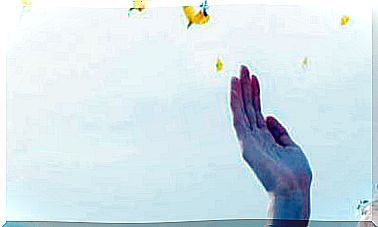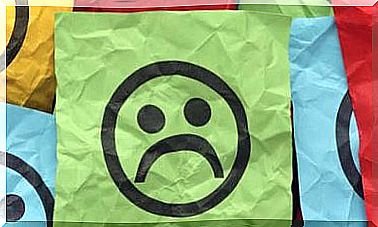How To Accept Reality And The Situation In Order To Move Forward
Sometimes we fight an inner battle, split in our relationship with the world. By accepting a situation, you gain clarity to give and receive without restriction.

Human beings sometimes find it difficult to accept the changes that life proposes, as well as the obstacles and conflicts that cross their path.
Before them, it is easy to get stuck and remain anchored in the complaint of what was desired and could not be, of what was lost or not received. We then reproach and claim the universe over and over again, as if it were governed by our own sense of justice.
It is difficult to gather the courage to surrender to what is greatest and powerful until you come to accept the reality, the situation. But life does not interrupt its course for that reason, nor does it stop surprising us with new twists and turns.
The burden of judging
The human being does not have the power to decide most of the crucial events of his existence, such as the country in which he is born, the time in which he lives, the body and the intellectual potential that he possesses, the parents and other people with whom he grows up, who he falls in love with or who will love him.
Lamenting or rebelling about it is a sterile struggle that only prolongs suffering. Instead, accepting reality, with all the hardness and greatness that make it up, allows you to open up to find a new path.
It is often said that what one resists persists, and what is accepted is transformed. The more you fight, complain and reproach, the more the link grows with what is being rejected.
However, when opposition ceases and acceptance appears, action becomes simple, fluid, gentle, and safe.
But how to accept? Acceptance arises from an attitude similar to that which develops during meditation, when thoughts are contemplated without identifying with them.
It consists of abandoning the habit of judging as good or bad, correct or incorrect everything that happens, both outside and inside oneself, because life moves beyond these labels.
As Lou Marinoff proposes in More Plato and Less Prozac: “When you are about to define the problem you are facing, try to find out what is happening without making judgments. You will be looking at what philosophers call ‘phenomena’, that is, events external to you. , facts that exist regardless of your beliefs, feelings or wishes about it. “
Learn from situations
It is difficult to overcome the inertia of engaging in judgment, but when the ability to create that space is developed, that silence beyond the “should be”, you can begin to perceive the world as it is and stop being a victim of situations to become in disciple of them.
Acceptance is the mechanism that connects each person with the resources available to adapt to circumstances, like the reed that moves with the wind without breaking.
It can help to keep in mind that some misfortunes bring with them a hidden seed or gift that becomes visible over time. How many people, after suffering a life-threatening illness, greatly appreciate the lesson that this experience brought!
It would be useful to ask whether it is possible to experience what is happening differently. The death of an elderly and debilitated person, for example, even if it involves mourning, can imply liberation for them and those close to them.
Deepak Chopra, in his book The Seven Spiritual Laws of Success , describes the so-called “Law of Distancing”, according to which, to obtain anything in the physical universe, one must first give up clinging to it:
“The need to cling arises from fear and insecurity, but the search for security is an illusion. Give up clinging to the known: if you enter the unknown, you will enter the field of all possibilities. Into the unknown, you will find the wisdom of uncertainty, where the liberation of the past and the old conditionings occurs. It is the field of all possibilities, where we free ourselves from the creative mind that directs the dance of the universe. “
All this involves not only giving up many pre-established ideas about oneself, others and the world, but also understanding that the pleasure of living cannot be embraced without also embracing the pain of existing. Loneliness, illness, old age and death are part of existence.
Viktor Frankl speaks of the maturational value of accepted suffering, of the meaning that suffering can be found through the lessons it brings.
Acceptance connects each person with their resources to adapt to circumstances, like the reed that moves with the wind without breaking.
The breaking of the old bucket
But it should be noted that genuine pain is much less common than is believed and that much of the suffering is the result of a kind of tantrum by failing to make reality conform to our will and expectations.
“There where we force ourselves, we get stuck and we suffer is the ego itself, which always manages not to accept reality and manipulates, calculates, makes conjectures, worries, tries to control, clings … instead of letting go and trust, instead of allowing everything to flow, create space and open up to receive the new, “writes Ascensión Belart.
It is said that Chiyonô, a Zen nun who was a student of Master Bukkó, practiced meditation patiently for thirty years without obtaining the fruits she sought.
On a full moon night, like so many others, Chiyokô carried water in an old bamboo patched bucket and the moon reflected off the surface of the water. The nun looked at her, thinking of the reflections and the source from which they came.
Then the rope broke, the bucket fell off the ground and the water ran across the floor. It is said that at that moment Chiyokô reached enlightenment. To celebrate it, he wrote this poem : “For a long time I have carried this old bucket / whose bamboo staves were breaking. / Until the bucket collapsed. / Now, there is no water in the bucket! / There is no moon in it. water! / Only the emptiness in my hand “.
It is the magic of acceptance: turn off the struggle, undo the old molds, heal and allow change.
The same happens in any process of personal growth: it is impossible to continue moving forward while denying a part of yourself. People can be accepted unconditionally or accepted only if a series of conditions are met , such as: “be a successful person”, “be a serene person”, “not be afraid” …
But what happens when those requirements cannot be met depending on the circumstances? Anxiety, depression, maybe even illness appear.
And even when those conditions are met, what price will have to be paid to meet them? How much effort and demand will it take?
Hidden perfection
The search for perfection in oneself and in others can hide an ideal of superiority and omnipotence that favors dissatisfaction. However, when the perfect is humbly renounced, then it is possible to embrace the greatness of the small and surrender more strongly to the pleasure of living.
Jorge Bucay told me , in an interview for Cuerpomente, that the enormous energy that is invested in hiding the barrel where everything that is rejected and ashamed is kept cannot be used in other things and prevents the enjoyment of life and relationships more authentic: “In order to release the ballast from the barrel, the first step is to understand that it is not a matter of hiding it deeper or putting more stones to bury it, but of letting it rise to the surface. The second step is to believe yourself valuable enough to tell yourself: I will be able to love myself whatever the content of the barrel. “
Looking at our children, our partner, our parents and ourselves feeling that they are perfect as they are, saying: “I love you exactly as you are without having to change anything”, produces miraculous effects on the other and on oneself.
Life is a continuous process of acceptances and a permanent dialogue with reality. You can choose to fight and try to prevail over it; Or navigate through it smiling at what it brings, bow to its mystery and its incommensurability, learning to see problems as friends and not as burdens, being disciples rather than victims or inquisitors of a great universe, which perhaps has a purpose. specific.
As Hermann Hesse says in Demian : “I was a project of nature, a project towards the unknown, perhaps towards the new, perhaps towards nothingness and my mission, my only mission was to allow that project that sprang from the depths to come true, to feel his will in me and to identify with him completely. “
The challenge of loving what happens
Byron Katie, author of Amar lo que es (Ed. Urano), remembers that to accept reality the first thing to do is focus on yourself.
It suffers when a thought is taken for granted that is at variance with what it is. So, ask yourself: “What would become of me without that thought? How would I feel if I didn’t have it?”
In the face of a misfortune, explanations are desperately sought. But, as Harold S. Kushner concludes in When Bad Things Happen to Good People (The Beginning Books), things often happen without a comforting explanation.
Accepting reality is accepting that the immutable is mutation, that neither good nor bad remains. That is why it is not advisable to become overly attached to the good things.
5 exercises to feel better about yourself
- Accept others. Set aside a day to give yourself and the people around you permission to be as they are without imposing any idea of how things should be or looking for a forced solution.
- Feel the force of life. Close your eyes and imagine that you are in front of your parents, that behind them are their parents, behind their parents, then their parents … As you look at all your ancestors, intuit a mysterious force – the force of life– that through these generations has come down to you. When you feel it, lower your head. Then turn around and, with your back to your parents, look towards your children and towards the life that remains to come through you.
- Learn to flow. Imagine that you are on the bank of a river and you get on a raft to navigate it. First the raft is tied to a tree by a rope, but little by little you let go of the rope and let the raft be carried away by the current. Open your eyes if fear appears and close them again to open yourself as much as possible to the experience of going down the stream without exerting any control over the direction the raft takes or its speed.
- Free yourself from judgments. The judgment of others is one of the main obstacles to accepting things. Close your eyes and while the thoughts flow without paying attention, let this phrase appear: “I free myself from the judgment of others.” Feel it as you repeat it over and over. Contemplate each of his words and enjoy the feeling of living more in accordance with your inner desires.
- Cultivate compassion. All human beings struggle to be happy and at the same time suffer. Suffering is everyone’s evil. Keeping it in mind helps develop compassion that allows acceptance of even those who have done us the most harm.
Books to learn to accept yourself
- Live and love in the soul; Joan Garriga, Rigden Institut Gestalt
- Self-esteem practices; Christophe André, Ed. Kairós
- A journey to the heart; Ascensión Belart, Ed. Herder









